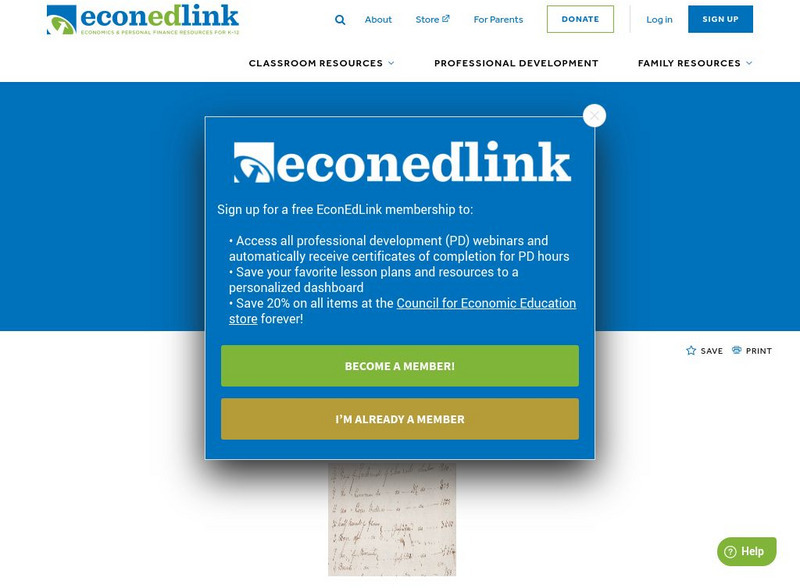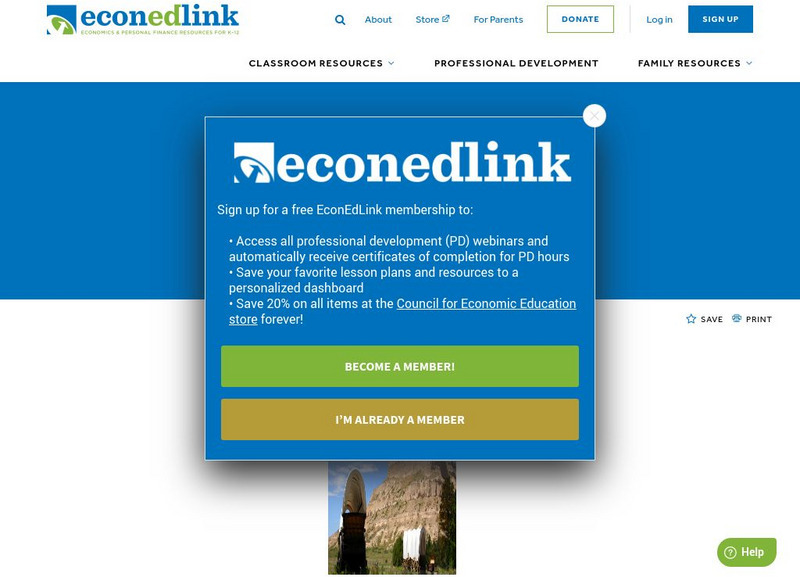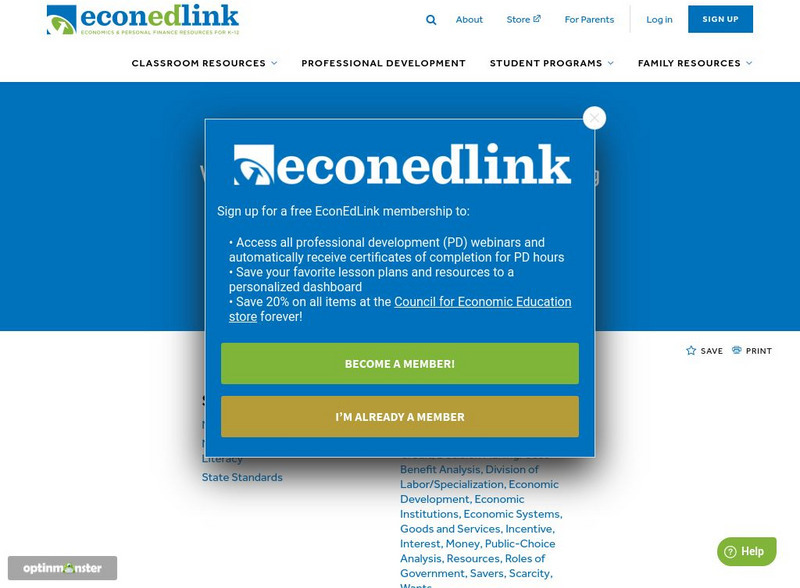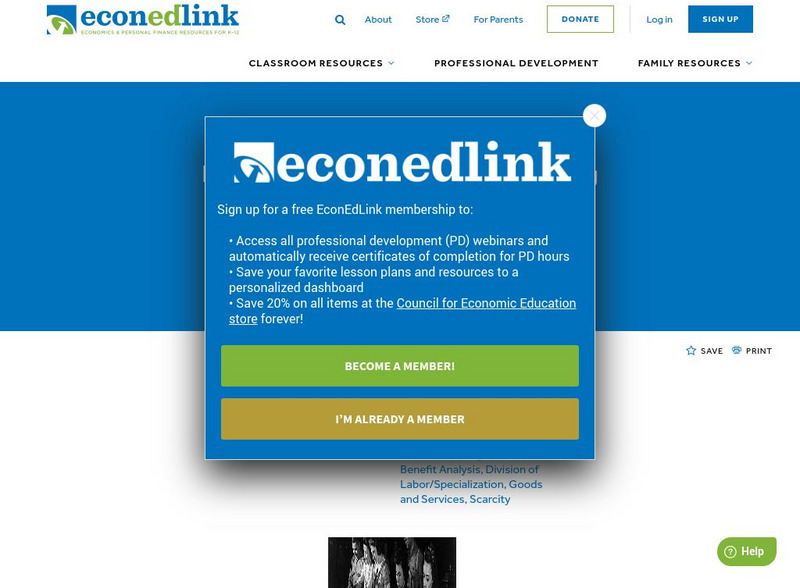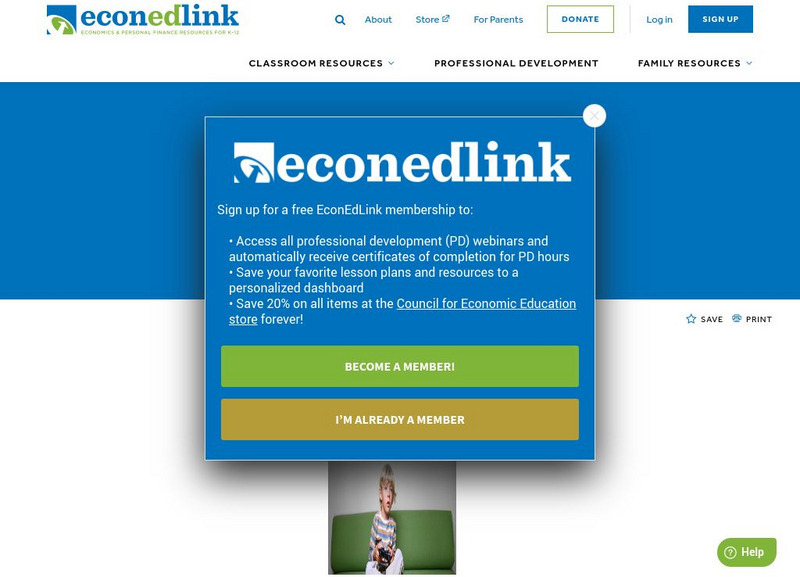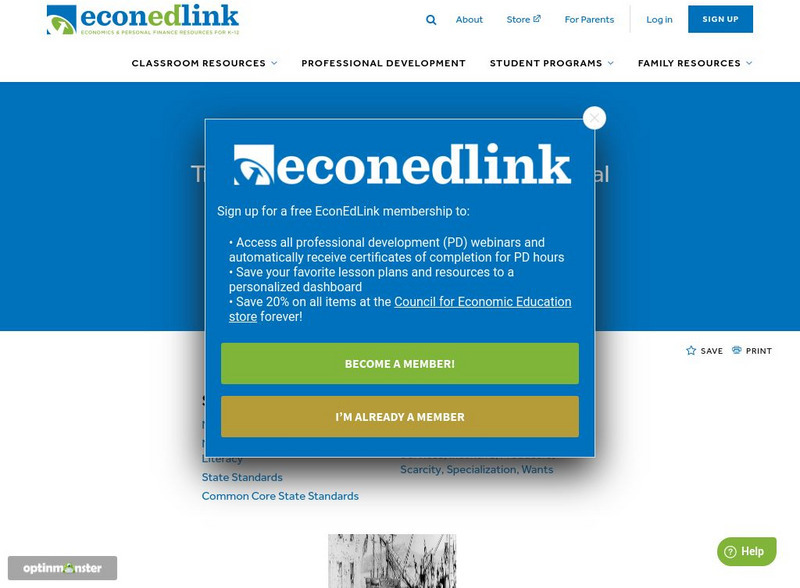Curated OER
Classifying Resources
Students discuss the difference between the three types of productive resources. In groups, they classify and organize examples into the correct category on a chart. As a class, they discuss how each type is used in the production of a...
Curated OER
To Market to Market
Fourth graders research a product and participate in an integrated simulation of a free market economy where students will create, buy and sell a good or service. In completing this activity, 4th graders understand the concepts and...
Curated OER
Adventures in Exploration
Fifth graders research major explorers in history using their textbook and then create a timeline using Timeline Software. Students participate in class discussions and write an essay about the explorer they researched.
Council for Economic Education
Econ Ed Link: Scarcity With the Lewis and Clark Expedition (Teacher Version)
The Lewis and Clark expedition was filled with scarcity issues. They made life and death choices based on scarcity. In this lesson, you will travel back to the early 1800's in a time machine and travel with Lewis and Clark. See if you...
Council for Economic Education
Econ Ed Link: Economic Spotter: Resources During Wwii
This is a lesson that deals with scarcity during WWII. Natural, human, and capital resources are discussed.
Council for Economic Education
Econ Ed Link: Off to Interactive Island
This site is a lesson that teaches students about scarcity and choice. Students participate in a simulation where they are asked to make choices about what they want to take with them in order to survive.
Council for Economic Education
Econ Ed Link: Work, Earnings and Economics: Using Lyddie by Katherine Paterson
In reading and discussing Lyddie, by Katherine Paterson, students examine basic economic concepts and explore the growth of labor unions and the role of government in a market economy.
Council for Economic Education
Econ Ed Link: Economic Spotter: Resources During World War Ii
In World War II pennies were made of steel and zinc instead of copper and women were working at jobs that men had always been hired to do. Why? Because during war times, scarcity forces many things to change!
Council for Economic Education
Econ Ed Link: If I Ran the Zoo Economics and Literature
Welcome to the Zoo! In this two-day lesson you will use Dr. Seuss' If I Ran The Zoo book to introduce the economic concepts to your students. You will also get the chance to use actual zoo criteria to help a zoo "choose" new animals.
Council for Economic Education
Econ Ed Link: I Can Dream Anything!
Go to this site for fun activities and a great lesson on personal choices and specialization. This lesson provides the primary teacher with an excellent opportunity to incorporate a character education lesson on self-esteem, while...
Council for Economic Education
Econ Ed Link: Paraffin Alia
All resources are limited. It is this simple fact--scarcity--that forces us to make decisions. When we do make a choice, we pass up some other opportunity. Opportunity cost is defined as the next best alternative not chosen, or the...
Council for Economic Education
Econ Ed Link: No Extra Room on the Mayflower
The students will explore the ideas of scarcity and choices by exploring a virtual model of the Mayflower. They will then pack a virtual suitcase making good choices about what they pack.
Council for Economic Education
Econ Ed Link: You Decide!
Think about a difficult decision you have had to make. After you decided did it work out? Why or why not? Why do you think decisions and choices are hard to make? We make personal decisions and we make decisions as groups. There is a...
Council for Economic Education
Econ Ed Link: Production Possibilities Curve
Learners will apply the concepts of scarcity, choice, and opportunity costs using a production possibilities curve. Students will interpret points inside and outside the curve. As an extension, learners will see the relationship between...
Council for Economic Education
Econ Ed Link: You Can Bank on This! (Part 2)
As in the first ', You Can BANK on This, you will learn that banking should not be confusing - it should be INTERESTING! Lesson Two will continue learning with Zing, but this time we will learn all about budgeting - and budgeting means...
Council for Economic Education
Econ Ed Link: Destination: Mars
Look up! Can you ever imagine standing on another planet and looking down at earth? We've been to the moon - now lets launch an expedition to Mars. Imagine all the preparation you will have to go through in order to have a safe and...
Council for Economic Education
Econ Ed Link: Scarcity With the Lewis & Clark Expedition (Student Version)
Use this EconEdLink intermediate lesson to teach your young scholars about the concept of scarcity. Allow students to use the interactive simulation of the Lewis and Clark Expedition to demonstrate their ability to make sound decisions...
Other
Foundation for Teaching Economics: Lesson 2: Opportunity Cost and Incentives
This lesson covers the National Content Standard 2: Marginal Decision Making. It provides key terms and concepts around scarcity forces, changing opportunity costs which affect incentives and choices. It includes links to a teacher's...
Council for Economic Education
Econ Ed Link: Hawaiian Economics: From the Mountains to the Sea
Ancient Hawaii was ruled by chiefs, who were responsible for the well-being of their people and for managing the islands' resources. The chiefs divided the islands into land districts shaped like pie slices called Ahupua'a (ah-who-...
Council for Economic Education
Econ Ed Link: Sand Art Brownies
In this lesson, you will learn about substitute goods. You will have choices to make in your role as a shopper. In making these choices, you will decide whether you are willing to accept one good as a substitute for another or not. Are...
Council for Economic Education
Econ Ed Link: Rationalizing Transplants
This lesson encourages students to explain the consequences of a non-market rationing process, to evaluate the consequences of restricting organ transplants to U.S. citizens, and to suggest alternative policies to reduce the scarcity of...
Council for Economic Education
Econ Ed Link: There Is Something in the Water
The United States is losing 60,000 acres of wetlands each year. Is this good or bad? Does anyone really want to live in swamps, fens, bogs, and marshes? Or is it better economics to drain the wetlands for other purposes like agricultural...
Council for Economic Education
Econ Ed Link: Booker T. Washington:"fifty Cents and a Dream"
Young Booker T. Washington had a dream. That dream was to use the resources at his disposal to earn the money necessary to get an education that would allow him and others to become financially secure. This lesson based on the picture...
Council for Economic Education
Econ Ed Link: Trouble Is Brewing in Boston: "Colonial Voices Hear Them Speak"
It's December 16, 1773 and many of the citizens of Boston are furious with King George's new tax on tea. Young Ethan, a printer's errand boy, has been given the task of conveying information concerning an upcoming protest meeting. As he...





